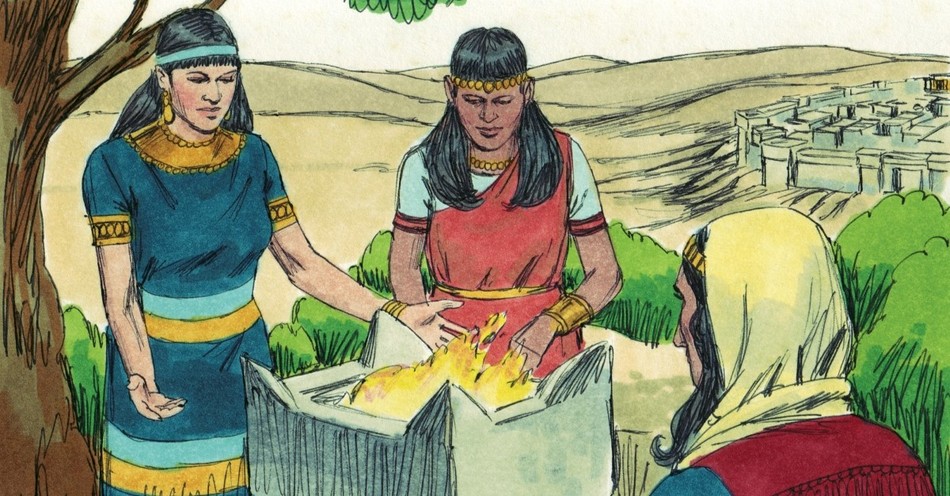We all hope to impact this world, and we imagine Bible women wanted that, too. Most modern women are bothered by how many biblical women are only known as someone’s wife or mother. There are many. For instance, there is Noah’s wife and Lot’s wife. We don’t even learn their given names. At least with Naamah, we’re provided her name and tribe of origin, the Ammonites. Other than that, however, the Bible only indicates that she was Solomon’s wife and Rehoboam’s mother.
Naamah may not have survived Rehoboam’s birth, which could explain why we know so little. Or, it just may not have interested the biblical author who recorded the lives of the kings.
Before we become too indignant that they only describe her as someone’s wife and as someone’s mother, it’s important to note she’s the only one of Solomon’s seven hundred wives to be mentioned by name. This makes mention of her significance. Was she more loved? Was she more influential? Was she Solomon’s first wife and mother of his first son? There’s so much we don’t know for certain. Still, we can learn some truths by studying what the Bible says about her.
Where Does the Bible Mention Naamah?
Three times the Old Testament repeats one line associated with Rehoboam: “His mother’s name was Naamah the Ammonite.” These repetitions occur in 1 Kings 14:21, 1 Kings 14:31, and 2 Chronicles 12:13. The lack of details about her doesn’t necessarily indicate a lack of importance. Naamah was the wife of a king and the mother of a king. This is a powerful place of influence in most cultures.
Reading Ancient Women with Modern Eyes
Too often, we view biblical figures through a modern lens and deem the record of their contributions inadequate. Naamah is an example of a figure with an immense impact on biblical history that is often missed because it is understated.
Ironically, the Ammonites from which she came wouldn’t have existed if it hadn’t been for the sinful choice of Lot’s daughters, who were also left nameless by the biblical authors of history.
In Genesis 19, we read that following the destruction of Sodom and Gomorrah, Lot and his rescued daughters lived in the hills outside of Zoar. These young women had lost everything when the angels whisked them out of the only home they’d ever known. They had been left without a mother, without their betrothed husbands, and we learn, without hope. They were likely traumatized but also, despite their miraculous rescue, had little faith in God’s provision for them.
The older daughter convinced her younger sister that they should make their father drunk and become pregnant by him. Each conceived a child by their father, Lot. The older sister’s son became the father of the Moabites, and the younger sister’s son became the father of the Ammonites.
From the faithless sin of two young women sprang enemies that created not only military problems for Israel but also introduced false gods. That’s a significant (but unfortunate) influence. These women’s impact rippled through the generations. Lot’s younger daughter was a distant ancestress of Naamah the Ammonite, mother of Rehoboam.
Which of Solomon’s Wives Was Naamah?
Solomon reigned for 40 years (1 Kings 11:42), and Rehoboam ascended to his throne after Solomon died (1 Kings 11:43) when Rehoboam was 41 (1 Kings 14:21). So, if the math is correct, Rehoboam was born before Solomon reigned as king. Naamah could have been Solomon’s first wife. It seems likely, but we cannot be sure, especially with Solomon’s vast number of wives and concubines.
Despite God’s warning in Deuteronomy 17:17 that the kings of Israel should not take many wives because they would be led astray, all the kings of Israel had more than one. This practice often had to do with solidifying political alliances through marriage. When Solomon ascended to the throne, he allied with Egypt and sealed it by taking Pharaoh’s daughter as his bride (1 Kings 3:1).
Solomon’s wives were not only his downfall but also the eventual downfall of Israel. Each foreign wife brought an allegiance to a foreign god or idol. Solomon allowed the worship of these foreign gods in Israel. It created within him a divided heart.
1 Kings 11:1-8 tells a powerful story.
“King Solomon, however, loved many foreign women besides Pharaoh’s daughter—Moabites, Ammonites, Edomites, Sidonians, and Hittites. They were from nations about which the Lord had told the Israelites, ‘You must not intermarry with them because they will surely turn your hearts after their gods.’ Nevertheless, Solomon held fast to them in love. He had seven hundred wives of royal birth and three hundred concubines, and his wives led him astray. As Solomon grew old, his wives turned his heart after other gods, and his heart was not fully devoted to the Lord his God, as the heart of David his father had been. He followed Ashtoreth the goddess of the Sidonians, and Molek the detestable god of the Ammonites. So Solomon did evil in the eyes of the Lord; he did not follow the Lord completely, as David his father had done. On a hill east of Jerusalem, Solomon built a high place for Chemosh the detestable god of Moab, and for Molek the detestable god of the Ammonites. He did the same for all his foreign wives, who burned incense and offered sacrifices to their gods.”
Molek worship is highlighted in this passage, most likely allowed to please Naamah as an Ammonite. We don’t know for certain that Naamah didn’t pass away giving birth to Rehoboam. However, Molek worship would have been a concession for her if she lived. If she didn’t survive, it was a concession for one or more of Solomon’s other women from foreign tribes.
Worship of Molech was particularly heinous as it involved infant sacrifice. The practices of those who worshiped this idol were wholly inconsistent with the life-giving worship of the One, True, Living God. Allowing this idolatry, along with the idolatry allowed to appease other women in his harem, became the downfall of Solomon and Israel.
What Happened to Naamah’s Son Rehoboam?
1 Kings 14:21 tells us that Rehoboam ruled over Judah for seventeen years. They were not good years for Judah.
1 Kings 14:22-24 records, “Judah did evil in the eyes of the Lord. By the sins they committed, they stirred up his jealous anger more than those who were before them had done. They also set up for themselves high places, sacred stones, and Asherah poles on every high hill and under every spreading tree. There were even male shrine prostitutes in the land; the people engaged in all the detestable practices of the nations the Lord had driven out before the Israelites.”
In the fifth year of his reign, Shishak, king of Egypt, invaded Jerusalem and ransacked the temple. All the treasures of the temple and royal palace, even the gold shields Solomon had made, were carted off. Rehoboam replaced them with bronze shields and lived surrounded by guards after that. His humiliated and impoverished kingdom was threatened by both foreign countries and King Jeroboam, who ruled over the Northern Kingdom of Israel.
The kingdom of Israel was divided. Rehoboam, son of Naamah the Ammonite, lived in constant warfare and under constant threat. This was the result of the influence of Solomon’s wives and concubines. Idolatry led to division and downfall. These women’s names may not be recorded, but their impact is on record.
What Can We Learn from Naamah’s Family?
When God warned the kings of Israel not to marry many wives, as was the custom of those around them, they probably didn’t understand the restriction. They were powerful men, after all. Kings are in charge of entire nations. What could the influence of one or two or one hundred women do?
Naamah may only be mentioned concerning her son, the king. However, her association with the Ammonites is a reminder that when she came into Solomon’s bed, she brought idolatry with her.
We don’t always see the relevance of God’s commands. Naamah’s ancestor, Lot’s wife, didn’t understand the importance of not looking back, but she became a pillar of salt. Her daughters didn’t appreciate the restrictions against incest, and Israel paid the price for that for generations.
Whether our names are recorded in history or we’re just known as someone’s daughter, wife, mother, sister, son, father, or husband is not ultimately what matters. Our choices matter. Our sins have an impact far beyond our lifetimes. Thankfully, other women in the Bible, like Ruth and Esther, demonstrate that godly choices can also have a lasting impact.
When you’re tempted to make a sinful choice, remember Naamah the Ammonite, mother of Rehoboam.
Photo Credit: Getty Images/BibleArtLibrary
This article is part of our People of Christianity catalog that features the stories, meaning, and significance of well-known people from the Bible and history. Here are some of the most popular articles for knowing important figures in Christianity:
How Did the Apostle Paul Die?
Who are the Nicolaitans in Revelation?
Who Was Deborah in the Bible?
Who Was Moses in the Bible?
King Solomon's Story in the Bible
Who Was Lot's Wife in the Bible?
Who Was Jezebel in the Bible?
Who Was the Prodigal Son?




